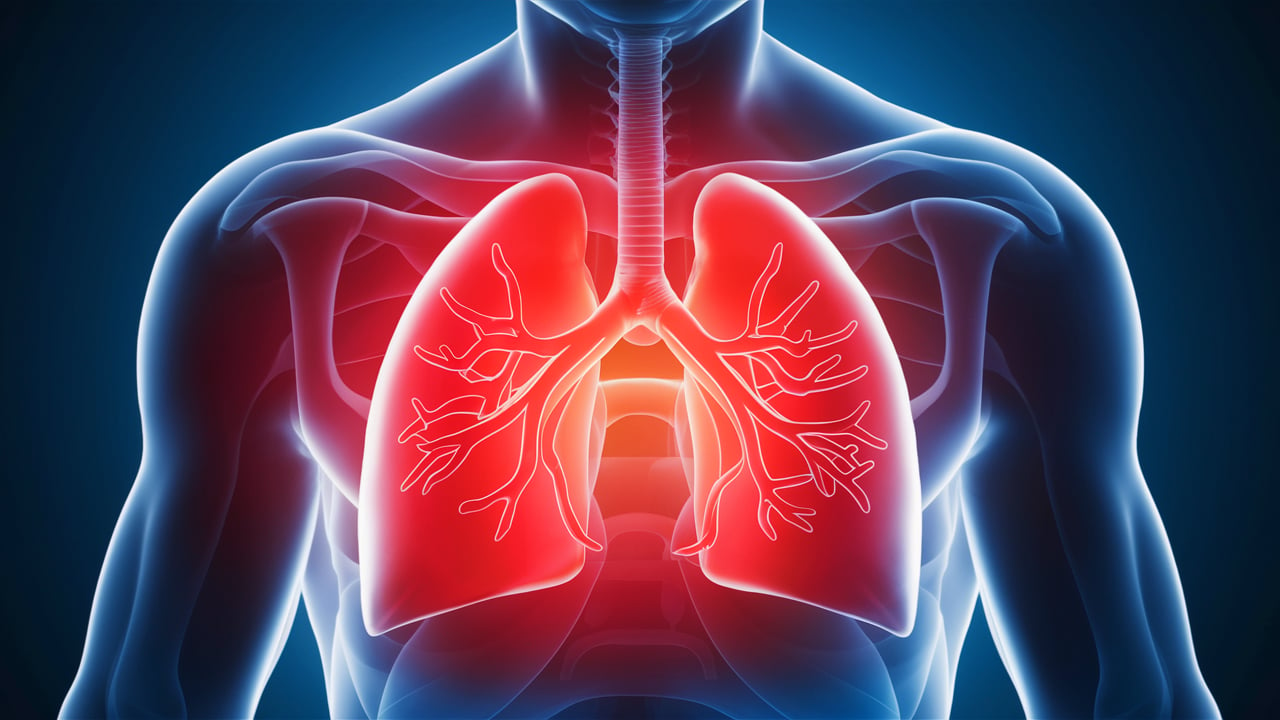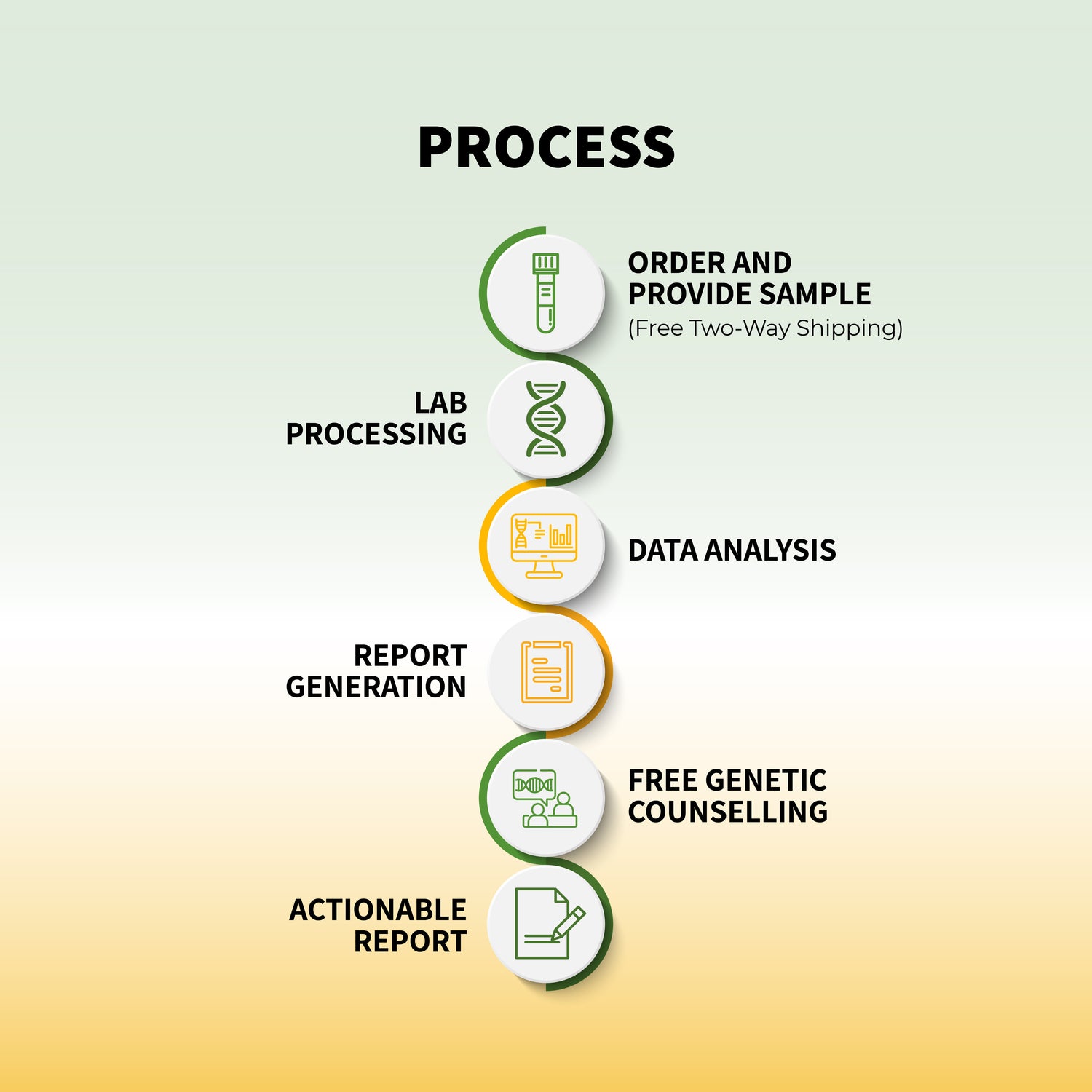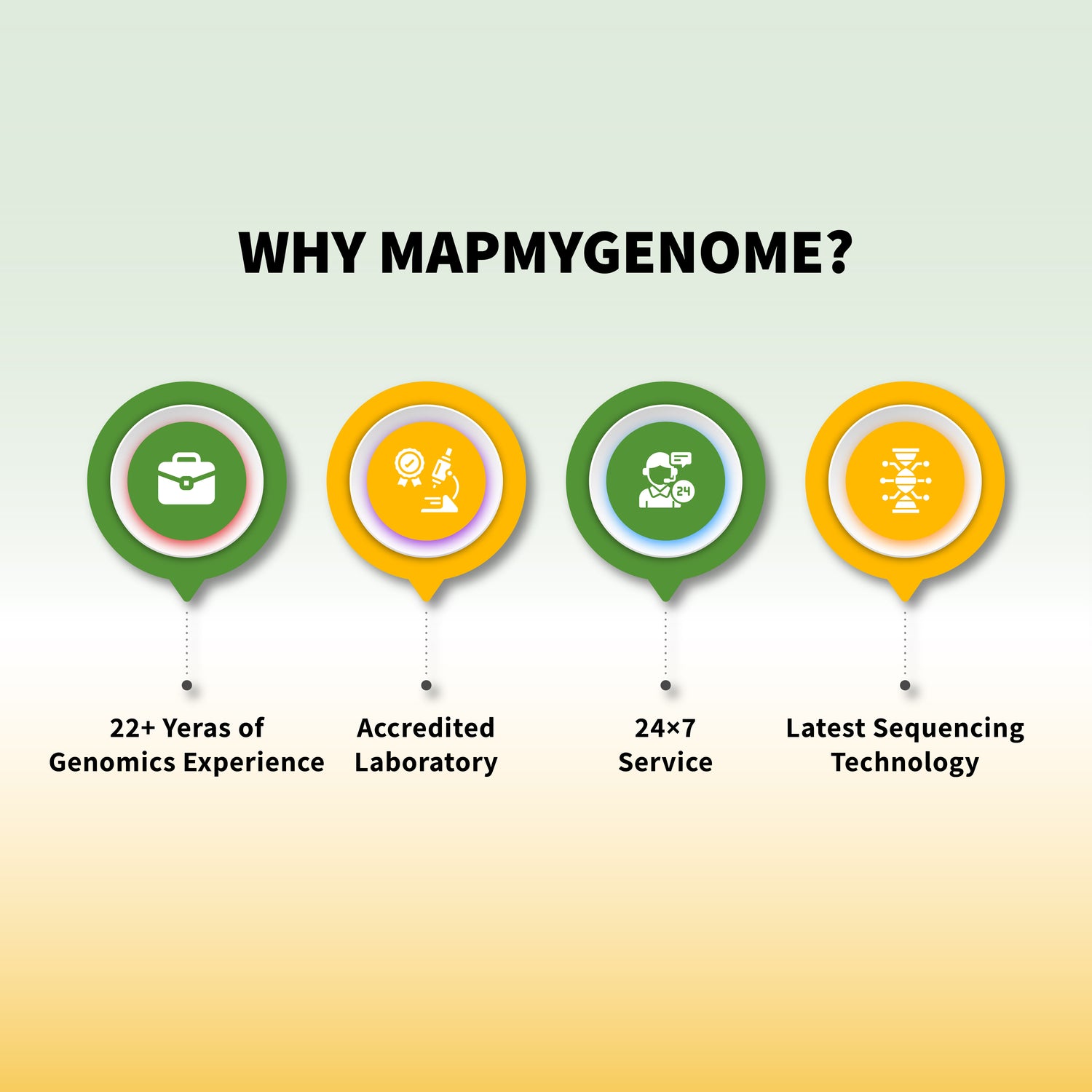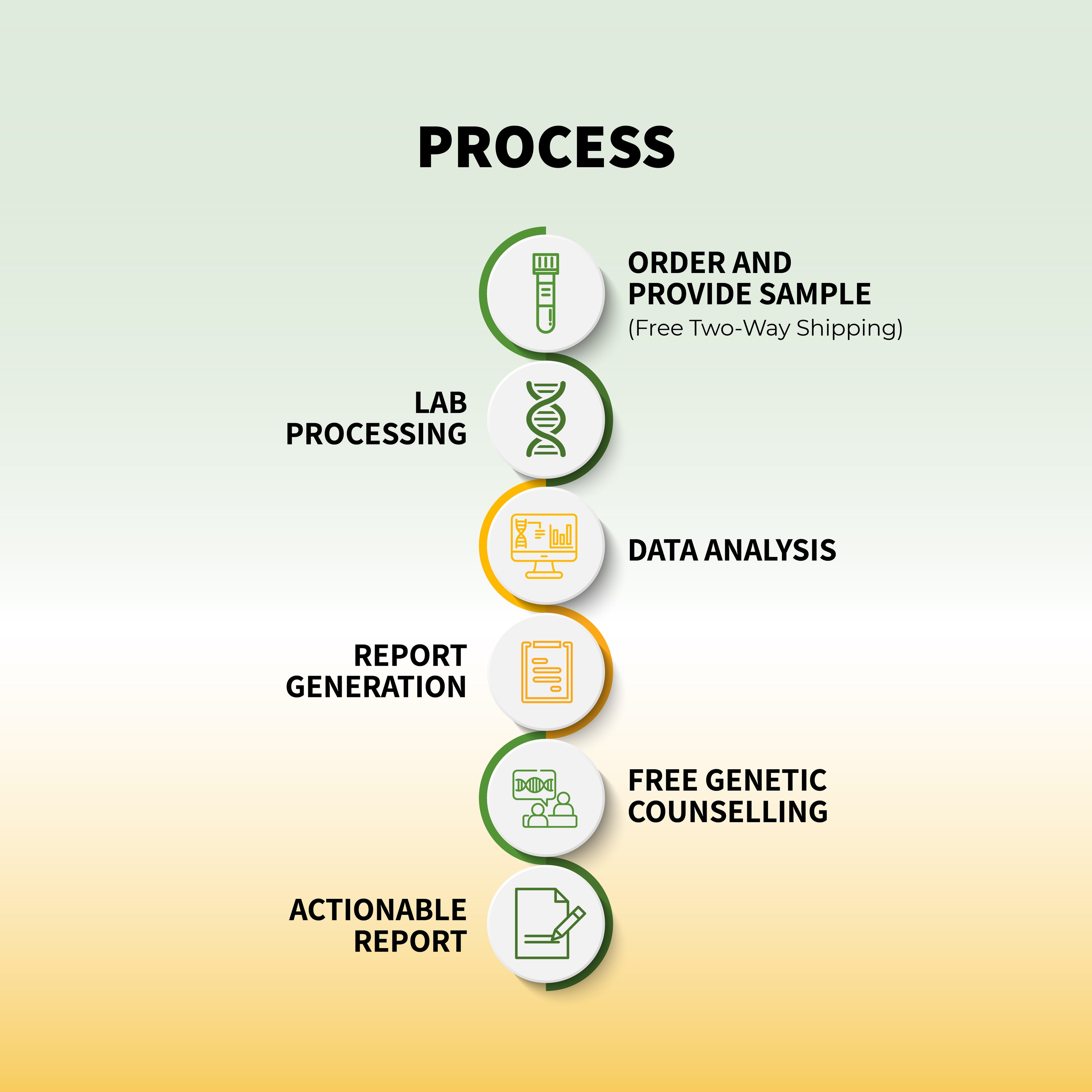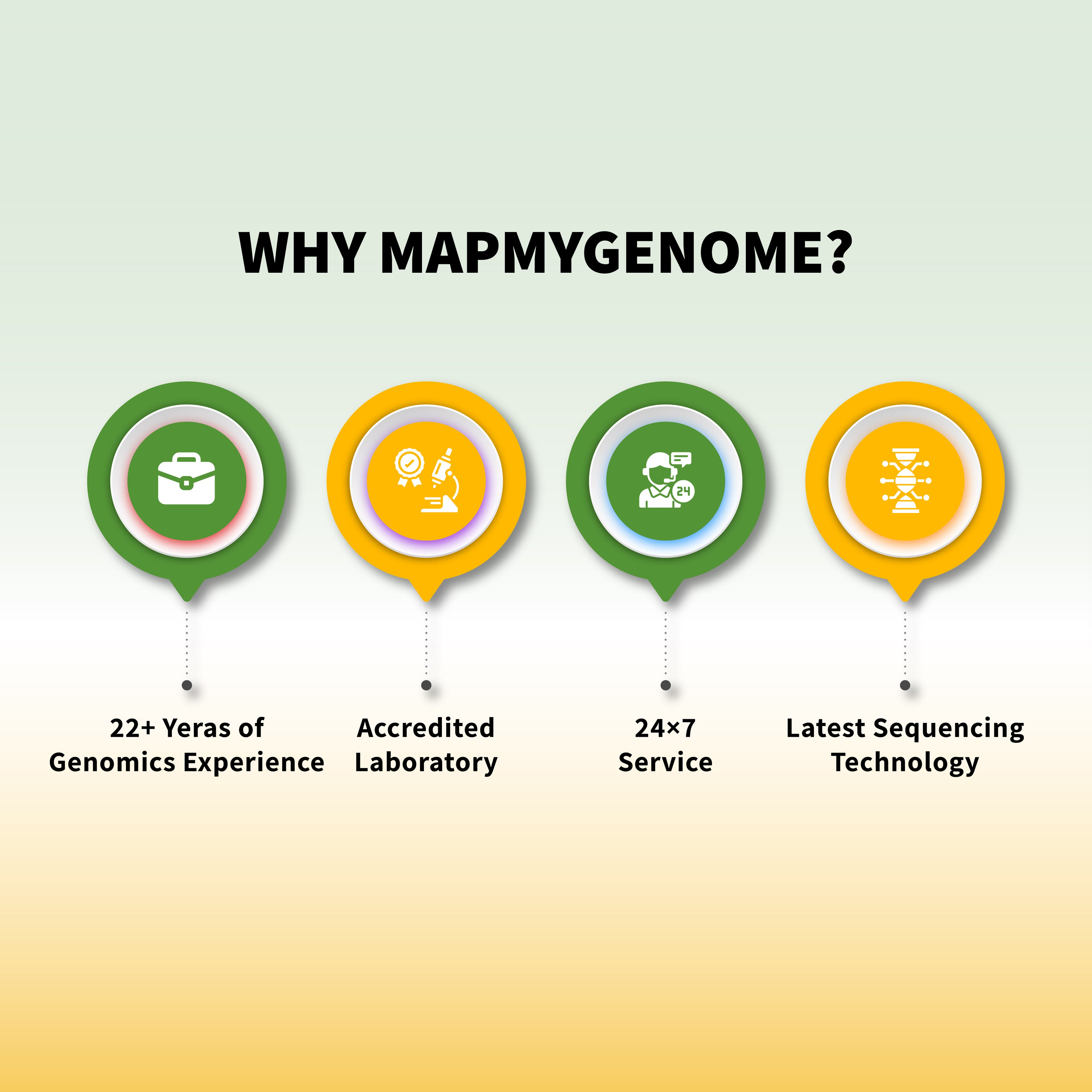फेफड़े का कैंसर दुनिया भर में एक प्रचलित और गंभीर बीमारी है। यह कैंसर से संबंधित मौतों की एक बड़ी संख्या के लिए जिम्मेदार है, इसलिए इसके कारणों, उपलब्ध उपचारों और इसके प्रबंधन में आनुवंशिक परीक्षण कैसे सहायता कर सकते हैं, यह समझना आवश्यक है। इस ब्लॉग में, हम इन पहलुओं का पता लगाएंगे, जिसमें MapmyGenome द्वारा जीनोमपैट्री आनुवंशिक परीक्षण पर विशेष ध्यान दिया जाएगा।
फेफड़े का कैंसर क्या है?
फेफड़ों का कैंसर फेफड़ों के ऊतकों में शुरू होता है, आम तौर पर वायुमार्ग की कोशिकाओं में। इसे आम तौर पर दो मुख्य प्रकारों में वर्गीकृत किया जाता है:
- नॉन-स्मॉल सेल लंग कैंसर (NSCLC) : यह सबसे आम प्रकार है, जो लगभग 85% मामलों में पाया जाता है। इसमें एडेनोकार्सिनोमा, स्क्वैमस सेल कार्सिनोमा और लार्ज सेल कार्सिनोमा जैसे उपप्रकार शामिल हैं।
- लघु कोशिका फेफड़े का कैंसर (एससीएलसी) : यह प्रकार कम आम है लेकिन अधिक आक्रामक है और अक्सर शरीर के अन्य भागों में तेजी से फैलता है।
कारण और जोखिम कारक
फेफड़े का कैंसर मुख्य रूप से हानिकारक पदार्थों के लंबे समय तक संपर्क में रहने से होता है, जिसमें धूम्रपान सबसे बड़ा जोखिम कारक है। हालाँकि, कई अन्य कारक भी इसमें योगदान करते हैं:
- धूम्रपान : फेफड़ों के कैंसर के ज़्यादातर मामले धूम्रपान से जुड़े होते हैं। धूम्रपान करने वाले और धूम्रपान के संपर्क में आने वाले लोग दोनों ही जोखिम में हैं।
- रेडॉन एक्सपोजर : रेडॉन, एक प्राकृतिक रूप से उत्पन्न होने वाली रेडियोधर्मी गैस है, जो फेफड़ों के कैंसर का कारण बन सकती है। यह कुछ घरों में उच्च सांद्रता में पाई जाती है।
- एस्बेस्टस और अन्य रसायन : अक्सर औद्योगिक स्थानों पर एस्बेस्टस और अन्य कैंसरकारी पदार्थों के संपर्क में आने से जोखिम बढ़ जाता है।
- वायु प्रदूषण : प्रदूषित वायु के संपर्क में लंबे समय तक रहने से फेफड़े के कैंसर का खतरा बढ़ सकता है।
- आनुवंशिक प्रवृत्ति : फेफड़े के कैंसर का पारिवारिक इतिहास किसी व्यक्ति के जोखिम को बढ़ा सकता है, जो आनुवंशिक कारकों के महत्व को उजागर करता है।
फेफड़े के कैंसर के लक्षण
प्रारंभिक अवस्था में फेफड़ों के कैंसर के लक्षण अक्सर नज़र नहीं आते, जिससे इसका पता लगाना मुश्किल हो जाता है। जैसे-जैसे बीमारी बढ़ती है, लक्षणों में ये शामिल हो सकते हैं:
- लगातार खांसी
- छाती में दर्द
- सांस लेने में कठिनाई
- घरघराहट
- खून की खांसी आना
- अस्पष्टीकृत वजन घटना
- थकान
यदि आप इनमें से किसी भी लक्षण का अनुभव करते हैं, तो उचित निदान और उपचार के लिए स्वास्थ्य सेवा प्रदाता से परामर्श करना महत्वपूर्ण है।
फेफड़ों के कैंसर का निदान
निदान में आमतौर पर कई चरण शामिल होते हैं:
- इमेजिंग परीक्षण : छाती का एक्स-रे और सीटी स्कैन फेफड़ों में असामान्यताओं का पता लगाने में मदद करते हैं।
- थूक कोशिका विज्ञान : सूक्ष्मदर्शी से थूक की जांच करने पर कैंसर कोशिकाओं का पता चल सकता है।
- बायोप्सी : कैंसर कोशिकाओं की उपस्थिति की पुष्टि करने के लिए ऊतक का नमूना लिया जाता है और उसका विश्लेषण किया जाता है।
उपचार के विकल्प
फेफड़े के कैंसर का उपचार रोगी के प्रकार, अवस्था और समग्र स्वास्थ्य पर निर्भर करता है। आम उपचारों में शामिल हैं:
शल्य चिकित्सा
सर्जिकल विकल्पों का उद्देश्य फेफड़े से कैंसरग्रस्त ऊतक को निकालना है। प्रक्रियाओं में शामिल हैं:
- लोबेक्टोमी : फेफड़े के एक भाग को हटाना।
- न्यूमोनेक्टॉमी : सम्पूर्ण फेफड़े को निकालना।
- सेगमेंटेक्टोमी या वेज रिसेक्शन : फेफड़े का एक छोटा सा हिस्सा निकालना।
विकिरण चिकित्सा
कैंसर कोशिकाओं को मारने के लिए उच्च ऊर्जा विकिरण का उपयोग किया जाता है। इसका उपयोग अकेले या अन्य उपचारों के साथ संयोजन में किया जा सकता है।
कीमोथेरपी
कीमोथेरेपी में कैंसर कोशिकाओं को मारने के लिए दवाओं का इस्तेमाल किया जाता है। इसका इस्तेमाल अक्सर सर्जरी और रेडिएशन थेरेपी के साथ किया जाता है।
लक्षित चिकित्सा
लक्षित चिकित्सा में ऐसी दवाएँ शामिल होती हैं जो विशेष रूप से कुछ आनुवंशिक उत्परिवर्तनों वाली कैंसर कोशिकाओं को लक्षित करती हैं। यह दृष्टिकोण स्वस्थ कोशिकाओं को होने वाले नुकसान को कम करता है।
immunotherapy
इम्यूनोथेरेपी कैंसर से लड़ने के लिए शरीर की प्रतिरक्षा प्रणाली को बढ़ाती है। चेकपॉइंट इनहिबिटर जैसी दवाएं प्रतिरक्षा प्रणाली को कैंसर कोशिकाओं को पहचानने और उन पर हमला करने में मदद करती हैं।
फेफड़े के कैंसर के उपचार में आनुवंशिक परीक्षण की भूमिका
आनुवंशिक परीक्षण ने व्यक्तिगत चिकित्सा को सक्षम करके कैंसर के उपचार में क्रांति ला दी है। कैंसर को जन्म देने वाले आनुवंशिक उत्परिवर्तनों को समझने से व्यक्ति की विशिष्ट स्थिति के अनुसार उपचार तैयार करने में मदद मिल सकती है।
मैपमायजीनोम द्वारा जीनोमपैट्री जेनेटिक टेस्ट
जीनोमपत्री एक व्यापक आनुवंशिक परीक्षण है जो किसी व्यक्ति की आनुवंशिक संरचना के बारे में जानकारी प्रदान करता है। यह फेफड़ों के कैंसर सहित विभिन्न बीमारियों के प्रति पूर्वाग्रहों को समझने में मदद करता है। यहाँ बताया गया है कि जीनोमपत्री फेफड़ों के कैंसर के प्रबंधन में कैसे सहायता कर सकती है:
- जोखिम मूल्यांकन : जीनोमपैट्री फेफड़ों के कैंसर के बढ़ते जोखिम से जुड़े आनुवंशिक मार्करों की पहचान करती है। यह जानकारी उन व्यक्तियों के लिए महत्वपूर्ण हो सकती है जिनके परिवार में इस बीमारी का इतिहास रहा है या जो अन्य जोखिम कारकों के संपर्क में हैं।
- व्यक्तिगत उपचार योजनाएँ : विशिष्ट आनुवंशिक उत्परिवर्तनों को समझकर, स्वास्थ्य सेवा प्रदाता ऐसे उपचार तैयार कर सकते हैं जो व्यक्ति के लिए अधिक प्रभावी हों। उदाहरण के लिए, यदि EGFR जीन में उत्परिवर्तन का पता चलता है, तो एर्लोटिनिब या गेफ़िटिनिब जैसी लक्षित चिकित्सा का उपयोग किया जा सकता है।
- निगरानी और रोकथाम : आनुवंशिक परीक्षण उपचार की प्रभावशीलता की निगरानी करने और आवश्यकतानुसार समायोजन करने में भी मदद कर सकता है। यह उच्च जोखिम वाले लोगों के लिए निवारक उपायों का मार्गदर्शन कर सकता है, जीवनशैली में बदलाव और नियमित जांच को प्रोत्साहित कर सकता है।
निष्कर्ष
फेफड़े का कैंसर एक गंभीर बीमारी है जिसकी मृत्यु दर बहुत अधिक है, लेकिन चिकित्सा अनुसंधान और आनुवंशिक परीक्षण में प्रगति आशा प्रदान करती है। कारणों को समझना, लक्षणों को जल्दी पहचानना और विभिन्न उपचार विकल्पों की खोज करना परिणामों में काफी सुधार कर सकता है।
मैपमाईजीनोम द्वारा जीनोमपैट्री जेनेटिक टेस्ट फेफड़ों के कैंसर के खिलाफ लड़ाई में एक शक्तिशाली उपकरण है। यह मूल्यवान जानकारी प्रदान करता है जो अधिक व्यक्तिगत और प्रभावी उपचार योजनाओं की ओर ले जा सकता है, जिससे व्यक्तियों को अपनी स्थिति को बेहतर ढंग से प्रबंधित करने में मदद मिलती है।
यदि आपको या आपके किसी प्रियजन को फेफड़े के कैंसर का खतरा है, तो अपनी सक्रिय स्वास्थ्य रणनीति के हिस्से के रूप में आनुवंशिक परीक्षण पर विचार करें। प्रारंभिक पहचान और व्यक्तिगत उपचार इस भयानक बीमारी के खिलाफ लड़ाई में महत्वपूर्ण अंतर ला सकते हैं।


